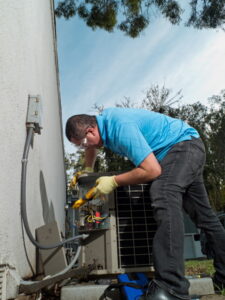Sometimes we all need some extra help to get going. Some people rely on coffee, exercise, or a shower to get going in the morning. Even your home’s comfort systems need a little jolt sometimes. In fact, your AC needs a big jolt of electricity to get started every time you use it.
A common question we get from homeowners is, “Why does my air conditioner take so long to start?” This is a fairly easy thing for a professional HVAC technician to diagnose because it’s usually related to the capacitor. Read on to learn about your AC’s capacitor and how to know when it’s time to call us to inspect it.
What Is an AC Capacitor?
Anyone who has seen Back to the Future has heard of a “capacitor.” Just like in the movie, the capacitor in an air conditioner is what’s responsible for its ability to turn on in the first place. The capacitor provides the initial jolt of electricity to your AC’s motor and is responsible for your AC’s ability to power on.
Although your AC requires far less than 1.21 gigawatts of electricity, it still requires a powerful burst of energy to power on. This is why the start-up stage of the cooling cycle uses so much energy.
The capacitor also works as an energy storage device. It stores electricity so that it’ll be ready to power your AC whenever it’s needed. It sends electricity to the AC’s motor in powerful bursts to get your air conditioner “revved up” to start the cooling cycle.
As you can imagine, the capacitor has a big job to do. If your capacitor isn’t working as it’s supposed to, your AC struggles to power on. Once the capacitor’s performance starts to suffer, you’ll notice when it takes forever for your AC to start. Luckily, you won’t need plutonium or Doc Brown to fix it. You’ll just need to call us to inspect your AC’s capacitor.
Why Do Capacitors Go Bad?
Although it happens rarely, capacitors can fail due to a power surge, a lightning strike, extreme physical damage, or high voltage. Any of these things can cause the capacitor to overload and burn out the electrical components.
Just like with any mechanical device, capacitors endure a lot of wear and tear and are thus subject to failure. The capacitor’s job of storing and supplying energy can cause it to overheat and wear out eventually. This is the most common cause of capacitor failure.
Because of the severity of capacitor failure, and the effects it can have on your entire system when it continues unchecked, here are the signs to watch out for:
- Your air conditioner doesn’t turn on at all
- Your air conditioner takes a long time to start up after switching it on
- You can hear a humming sound from inside the unit
- The automatic shutoff is triggered
- Your utility bills have skyrocketed
If you’ve been asking yourself why your AC takes so long to start up, give us a call today. We can determine if it’s the capacitor or if it’s another issue altogether.
To schedule AC repairs in Colorado Springs and the surrounding area, contact the team at Robbins Heating & Air Conditioning today.

